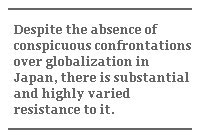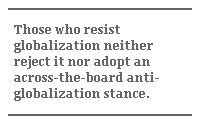Where Have All the Protesters Gone?
Where Have All the Protesters Gone?

HELSINKI: Far fewer than the usual number of protesters were on the streets when the World Bank and the IMF met for their annual conclave in Washington on October 2-3. While many observers interpret this as evidence that the anti-globalization movement is on the wane, that may not necessarily be the case.
Consider the parable about a man who looks for his keys under the streetlights instead of where he lost them. Asked why, he said, "Because it's easier to see where the light is better." The resistance to globalization may be found by shedding light not only on demonstrations in Washington, but by also looking beyond those public displays. What Prime Minister Tony Blair derided as the "traveling circus" of anti-globalization is not fading out; it's simply adapting to the post-9/11 phase of globalization.

But is it really anti-globalization? Just as with the debate over the word "terrorism," in defining anti-globalization, the power of language matters. Language conjures up meanings and images, and accordingly, the vocabulary varies according to the positions of the strong and the weak. Recall that during the apartheid era, South Africa's white redoubt and President Ronald Reagan alike called the imprisoned Nelson Mandela a terrorist, but he later received the Nobel Peace Prize.
Similarly, the idiom anti-globalization, deployed by star columnists and celebrity economists in the West, pigeonholes diverse actions. The difficulty is that it slots a wide variety of stances on globalization in two boxes: for and against. This over-simplification obscures myriad complaints about globalization and the debates over ways to engage, not evade, it.
Moreover, the use of the prefix anti- defines the resistance solely as a negation and, thus, the term eliminates the idea of the creation of positive alternatives. Many critics resist not because they are against aspects of globalization such as increased access to innovative technologies, more information, and new knowledge. Rather, without entertaining fantasies about a make-believe world, they are trying to imagine possibilities for a just world, an alter-globalization.

Now, the main sites of the conflict over globalization are no longer fortified meetings of international economic summits. So, too, the strategy of protest no longer centers on counter-summits at the Battles of Seattle. More often, the issue is framed as the conflict over the efforts to secure economic globalization by military means. This debate is largely about "global empire."
The global justice movement, heterogeneous networks without a hierarchy of leaders, is merging with the peace movement. They see President George W. Bush, aided by his squad of advisors, as the commander-in-chief of militarized globalization. While the campaign against corporate power and the powerful international economic institutions continues, a prime target of protest is US military interventions that would safeguard globalization.
Another site of contesting globalization can be found in practices of everyday life, certainly a more subtle and latent form of resistance. My students at Ritsumeikan University in Kyoto prepared a paper on "The Resistance to Genetically Modified Foods in Japan." Strikingly, the students' incisive research shows that, despite the absence of conspicuous confrontations over globalization in Japan, there is substantial and highly varied resistance to it.

In a country that has not experienced large-scale protests against globalization, the government supported the biotechnology industry's efforts to redesign plants using genes from other organisms, including different species. Opposition came not from head-on street demonstrations, but from consumers, especially the Consumers Union of Japan, and dairy farmers. Not stridently voiced, their apprehension reflects uncertainty over safety, the ethical question of tampering with nature, and media coverage and advertisements regarding genetically modified foods. Certain Japanese food companies felt obliged to address public concerns through either official pronouncements or altered policies. For example, Taishi Food Industry stated that "we never use GM [genetically modified] crops as raw materials." Similarly, Kikkoman, Japan's largest soy sauce company, changed the soybeans in its "marudaizu" series and labeled its nongenetically modified products.
A second team of student researchers prepared a paper on "WTO and Farming Product (Rice)," which details another quiet form of resistance. Not surprisingly, Japanese rice growers oppose opening to the global market because they do not want to face stiff international competition. Also, they perceive open markets as a threat to their identity, connections to nature, and cultural and spiritual heritage, of which rice is a principal part. Competition from overseas and mechanized technology endangers family farming, as well as the life-ways and values attendant to it.
For many Japanese consumers, the taste of foreign rice is unappealing. They fear that the pesticides applied in countries with little regulation present health risks. At bottom, the issues regarding governmental policy and the WTO's promotion of free trade are seen as matters of cultural dignity, food security, and environmental protection. Without making big noise, their resistance meshed several forms, some of them different from the Western varieties.

Yet another site of resistance to globalization is within people's mindsets. In Washington, in April 2002, a colleague, 12 graduate students, and I interviewed 243 participants at a rally sponsored by the organization Mobilization for Global Justice. We administered our questionnaire consisting of 25 items about participation in protests, attitudes toward globalization, and the strategies of the global justice movement. When asked the most important reason for protesting globalization, only 6 percent of the interviewees said "to abolish the international financial institutions." The largest single response was to oppose US foreign policy. The majority of those interviewed regarded the US government as an active, interventionist agent of globalization.
Queried about violence, nearly two-thirds of the interviewees ruled it out, while only four percent strongly agreed that violence is a legitimate strategy. A large plurality of those surveyed disapproved of violence under any circumstances, invoking the names of Mahatma Gandhi or Martin Luther King, Jr., or a religion to justify their position.
In our survey of changing attitudes, we found that those who resist globalization do not reject it or adopt an across-the-board anti-globalization stance. Although core international economic institutions are seen as problematic, the resistance embraces the gains of globalization.
The agenda has shifted to what can be done to harness globalization so that its benefits are inclusive and its processes are more transparent, participatory, and democratic. The emphasis is on formulating concrete, affirmative proposals. To develop them, there are infrastructures, such as the San Francisco-based International Forum on Globalization. Also, since 2001, the World Social Forum has brought together representatives of social movements from several countries. Meeting in Porto Alegre, Brazil, and then in Mumbai, India, participants think about ways to enact alternatives to neoliberal globalization and have established regional forums.
Increasingly, the protest over the dark side of globalization may be found both within and outside governments and intergovernmental organizations. Chaired by the foreign ministers of a northern and a southern country, Finland and Tanzania, the Helsinki Process on Globalisation and Democracy is assembling leading globalization actors and activists to develop and implement ideas for equitable human security.
The key to removing the blinkers is to turn on the high and low beams. The task is to illuminate not only the street theater that dramatizes the harsh side of globalization, but also the other stages where new forms of resistance and novel opportunities may be found.
James H. Mittelman is a professor in the School of International Service at American University, Washington, DC. This article extends arguments in his book “Whither Globalization? The Vortex of Knowledge and Ideology,” published last month by Routledge.